How to remove negative reviews and repel an attack on reputation: personal experience
An honest story about how one character wrote about us about a thousand anonymous reviews about us, how we deleted them and how to do it ourselves in a few hours.

About a year ago, during negotiations with customers, my salesperson heard a strange thing: “There are a lot of negative reviews about you on the Internet.”
I asked for time to sort it out. Googled and found many reviews.
Here is an example of one of the reviews.

And here is another one.

In the review, as you can see, neither the name nor the name of the site is indicated. But it’s quite so muddy.
And most importantly, there have never been such customers in my studio. But how to prove this to the site and, most importantly, to the client?
We called the customer back and said that there were no company names in the reviews and that we had never worked with such people. He took our side, and we signed an agreement.
Now I had to do something with the reviews.
Googling the text of the reviews, I found out that they were posted on 39 (!) Sites. That is, someone does not love us so much that he composed several stories of the same type and posted more than a hundred reviews.
I started looking for solutions to the problem and asking in the relevant communities. What in the end I found out.
Many companies offer the removal of such reviews, an average of 10 thousand rubles per review. But this is a million (!) For a hundred reviews. Plus, nothing prevents the author from writing anonymous letters, and there will not be enough budgets for such a war. In addition, any war is a war of budgets, and when you spend more budget than an attacker, he will defeat you, all other things being equal.
As a result, I had to deal with the problem ourselves.
An additional argument in favor of this was that the “reputation managers” very vaguely answered the question of how they would delete these same reviews. And since there are secrets, then everything is not as complicated as it seems.
You need to respond to reviews. Obviously fake customers should be asked for transaction details. In our case it’s simple: the customer knows his legal entity for sure and has definitely not forgotten it since the transaction. Accordingly, under each review, our answer appeared:

Naturally, under no review there was an answer to this question, so it was obvious to any observer: the review was fake. Unfortunately, they could not advise anything sensible articles from the Internet. They were generally designed for how stores work with reviews of real, but dissatisfied customers. And this is clearly not the case.
In the process of working with reviews, I registered my personal dashboards on most review catalog sites, so when new reviews appeared on the same sites over time, I learned about this not from the customers, but from the notifications of the otzoviks themselves.
New reviews differed from previous ones in that they were signed with a very specific name. Here is an example of such a review.
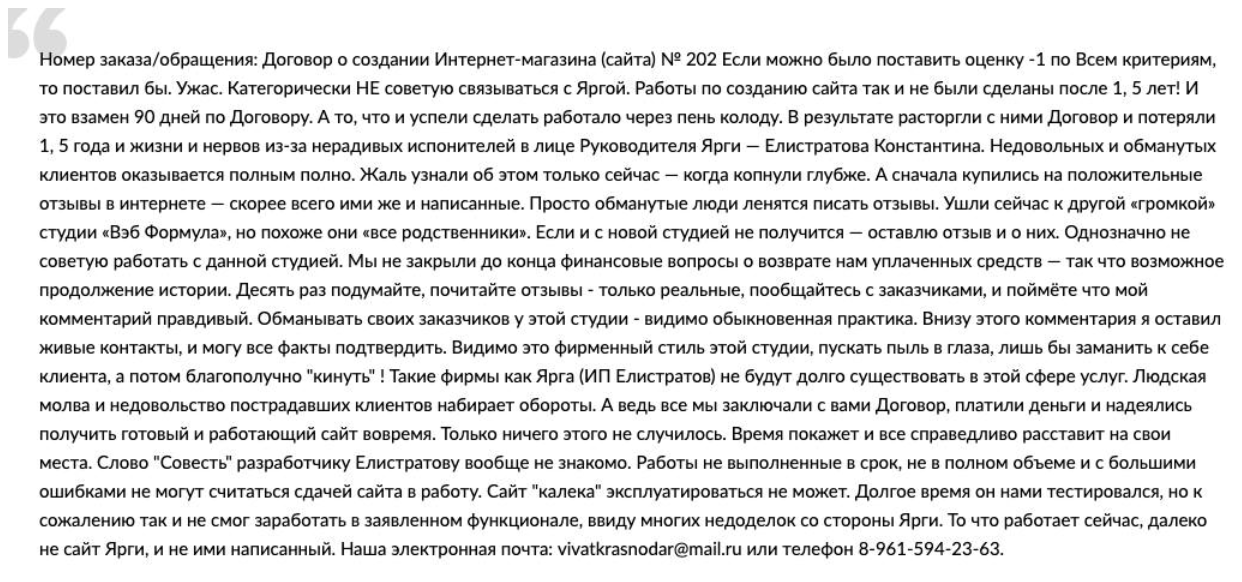
Realizing that the story with the anonymous letters did not work, their author was forced to open up and write his real data.
So we found out who this cowardly, but incredibly motivated person who was not too lazy to scribble hundreds of reviews.
This is a system administrator (and part-time brother of the founder) in a small Krasnodar company, which decided not to pay us for the site and stole it from the server. And having received a lawsuit in court, I didn’t come up with anything better than trying to harm reviews. That is, they are so sure of their wrongness that they not only did not file a lawsuit, but, having received mine, did not send a counter.
I set out this simple story point by point in the response to the reviews, trying to make it easy to check any point from the answer from open sources.
Below is the text of the response posted on all sites.
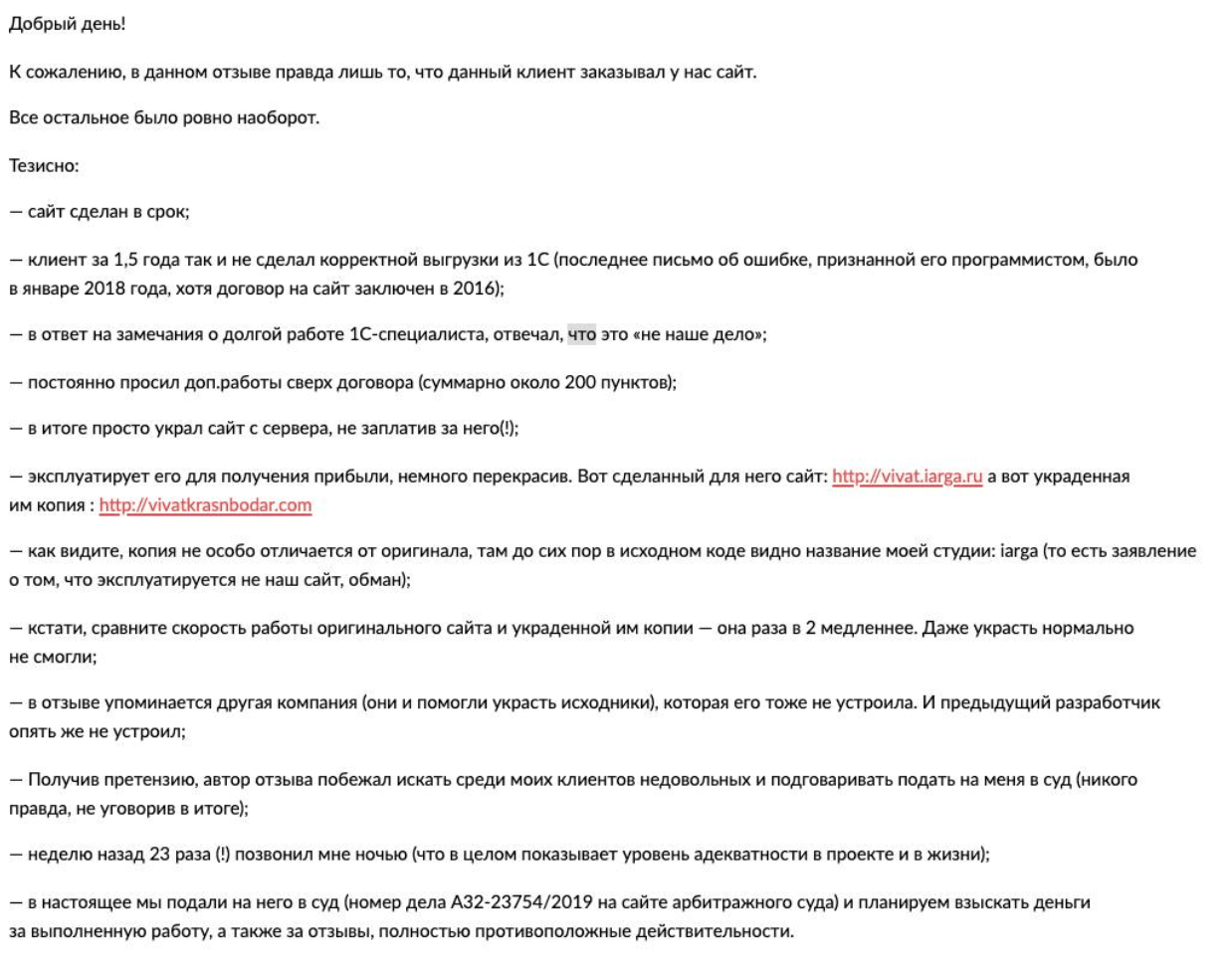
From time to time, the author of the review pereklinitsya, and every two or three months he gets involved in a dispute, never answering the essence of the comments, but always trying to cheat and get away from the topic. You can read his pearls, for example, here
Funny detail. The recall mentioned another studio. It was she who helped steal the site. But the author is also unhappy with her.
And one more: one of the reviews was left from the account of the same studio. This is easy to follow: she forgot to log in and wrote positive reviews to her customers from the same account. Now the profile is banned as obviously fake, but everyone remembers the screenshots.

From personal experience, through trial and error, we figured out how to remove reviews from the Internet. There are two scenarios for deleting a review.
For anonymous - when the author uses a fictitious name or for one reason or another does not want or cannot name the present (usually out of fear of getting a lawsuit for this).
For non-anonymous - when the author indicates a real name and a real company and you really worked with this company and can not prove the opposite.
There are two types of sites. Normal and garbage. On normal, there is moderation, a response with threats or insults will be instantly removed. Here is an example in the screenshot when the review was demolished for obvious rudeness.
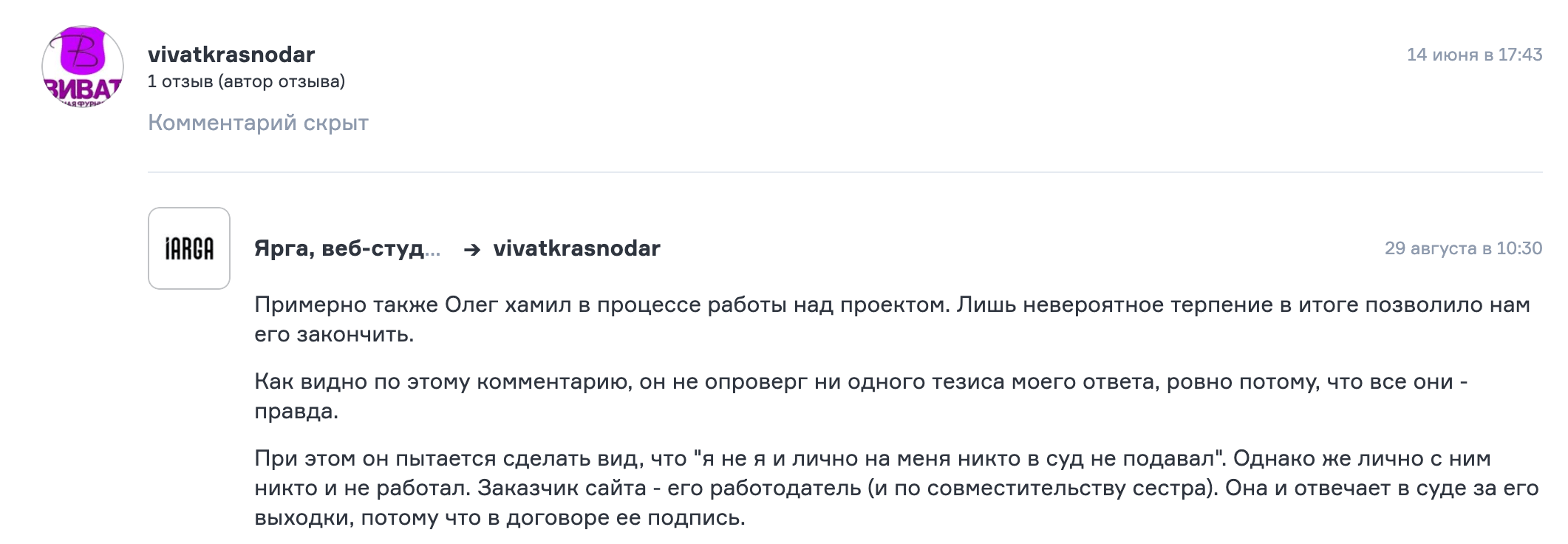
There is no moderation in the trash. Feedback can be placed any. Do not finish the support. Here is an example of our patient's pearls from a garbage can.
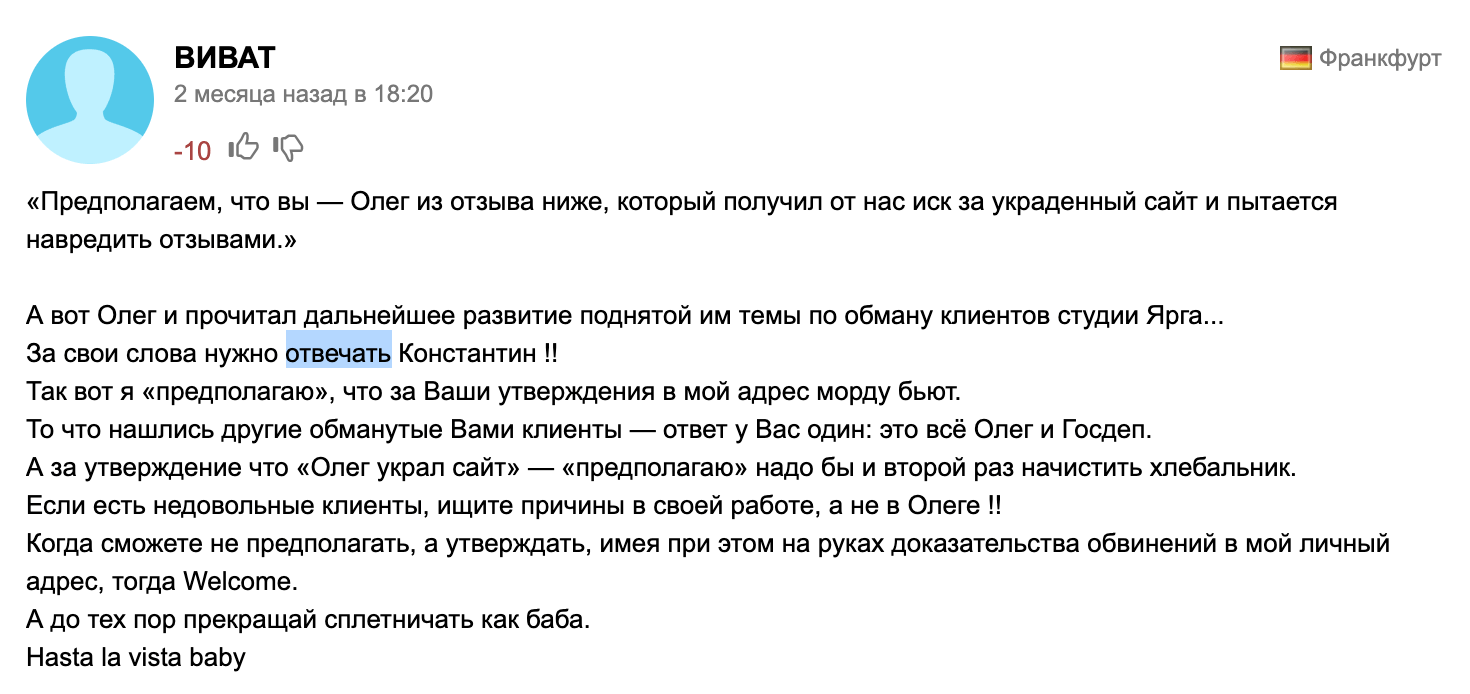
Offtopic: it is expected that in life (for example, meeting in court), the “cleaner” of the baker’s bread smiles sweetly and stands aside. Fortunately, search algorithms make a good distinction between normal otzoviks and garbage dumps, and they are not in the top of the search results.
Where to hide the corpse? On the second page of search results.
In the end, I just decided not to touch everything that is beyond the first page of the search. It turned out to be enough to remove reviews from 5-7 main sites in order to never again hear questions from customers about them.
Here is a list of sites with adequate moderation:
Under each review on these sites, I previously wrote a question with the details of the transaction. Now it came in handy. On some sites there is a button "Report a comment." On others, you can write to tech support.
The complaint tells why we consider this review a fake. Here are some examples.

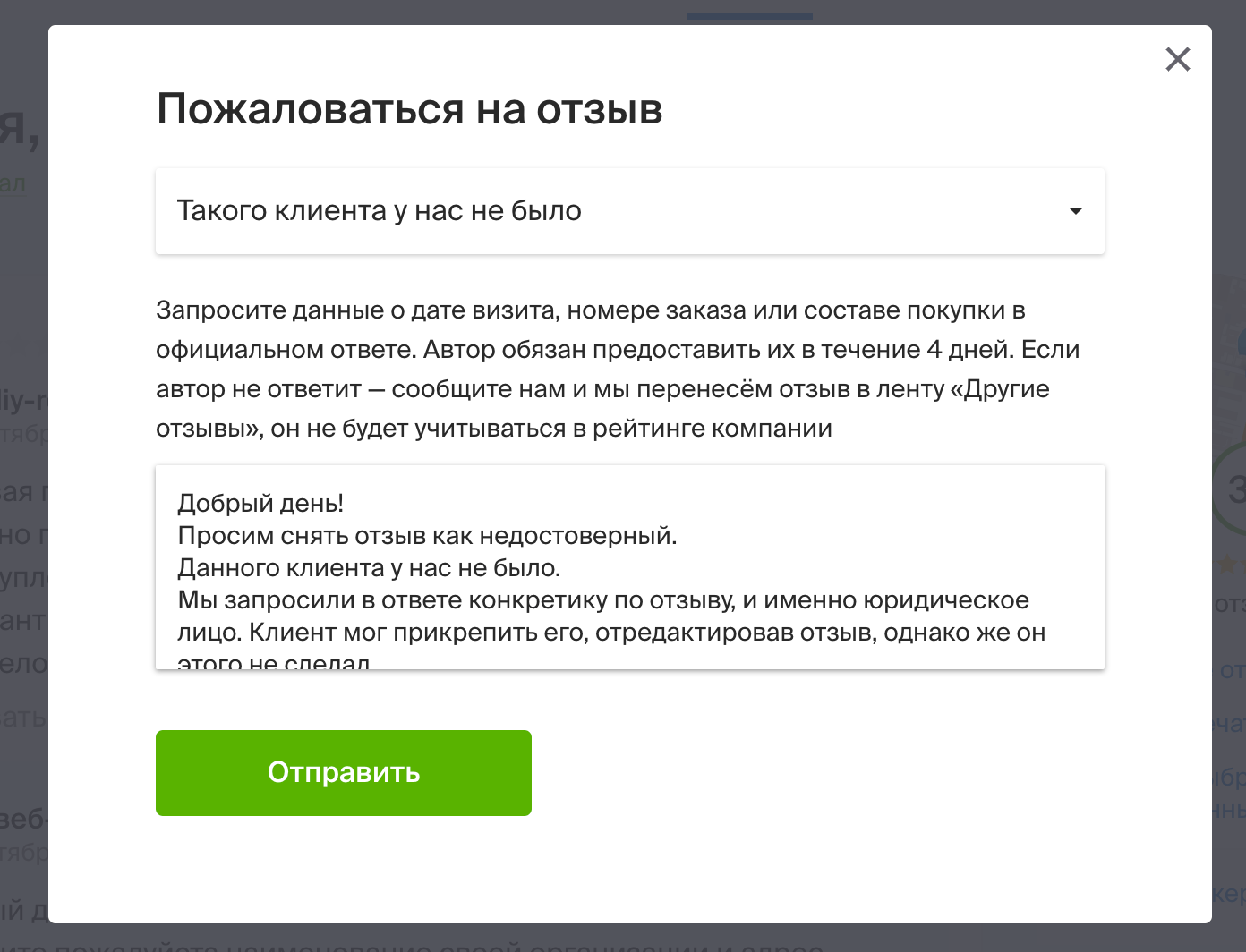
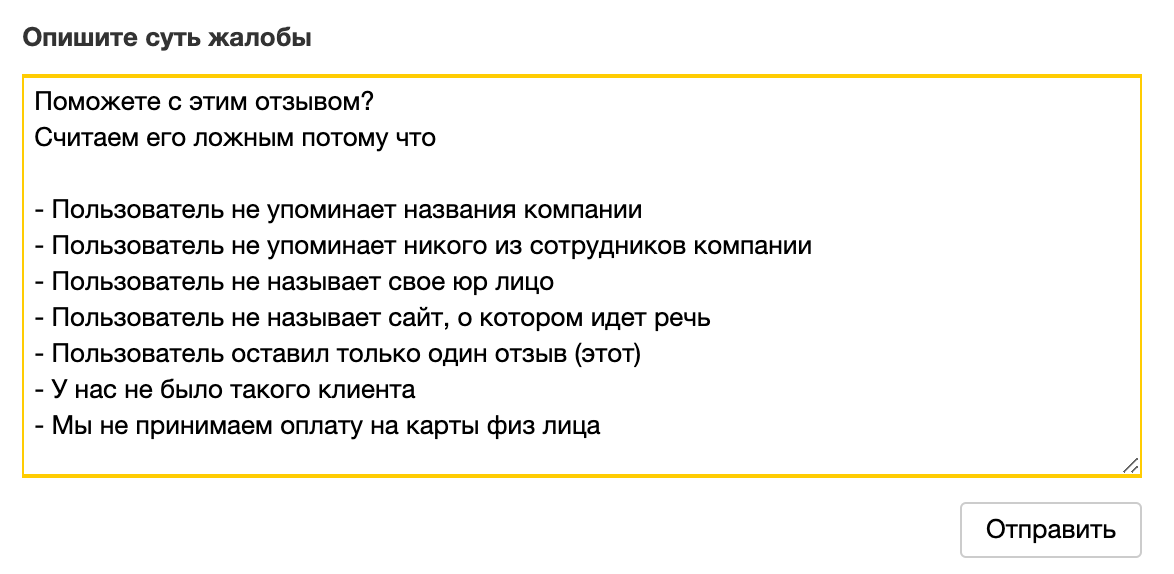
On average, three to four days after such a complaint, the review will be deleted.
All!
This is what "reputation managers" ask for 10 thousand rubles (for recall).
If your patient is particularly persistent and writes reviews faster than support removes them, find direct contact from support engineers. This is not easy, but it completely demotivates the opponent: the reviews are demolished faster than he writes them (and sometimes put on pre-moderation).
This is a very, very, very long procedure.
And darling. Also very much. But if you're lucky, in a year you will be able to hang the costs of it on the author of the reviews.
First you need to notarize the site. It is not as simple as it seems. The notary draws up a site inspection protocol. The protocol describes each button on the pages and how we got to these pages. It turns out that each site has a rather big Talmud.
With this protocol you apply to the arbitration court with a claim for recognition of the information is not true.
The arbitral tribunal shall render a decision. The decision states "information is not recognized as true and its dissemination in Russia is prohibited."
And already under this decision, technical support easily blows reviews.
Here are examples of such cases (enter the number on kad.arbitr.ru):
No. A41-57438 / 2017.
No. A40-171073 / 2017.
No. A56-89394 / 2016.
No. A40-255374 / 2016.
What to do during this?
Thoroughly respond to negative feedback so that it is obvious that you are right.
Ask four to five customers to write reviews - they will push the negative review down.
Continue to clean anonymous letters - they will appear :)
Although the court is still in the process, questions about the reviews have ceased to come from customers. The campaign was a success.

Background
About a year ago, during negotiations with customers, my salesperson heard a strange thing: “There are a lot of negative reviews about you on the Internet.”
I asked for time to sort it out. Googled and found many reviews.
Here is an example of one of the reviews.

And here is another one.

In the review, as you can see, neither the name nor the name of the site is indicated. But it’s quite so muddy.
And most importantly, there have never been such customers in my studio. But how to prove this to the site and, most importantly, to the client?
We called the customer back and said that there were no company names in the reviews and that we had never worked with such people. He took our side, and we signed an agreement.
Now I had to do something with the reviews.
Googling the text of the reviews, I found out that they were posted on 39 (!) Sites. That is, someone does not love us so much that he composed several stories of the same type and posted more than a hundred reviews.
I started looking for solutions to the problem and asking in the relevant communities. What in the end I found out.
Delete
Many companies offer the removal of such reviews, an average of 10 thousand rubles per review. But this is a million (!) For a hundred reviews. Plus, nothing prevents the author from writing anonymous letters, and there will not be enough budgets for such a war. In addition, any war is a war of budgets, and when you spend more budget than an attacker, he will defeat you, all other things being equal.
As a result, I had to deal with the problem ourselves.
An additional argument in favor of this was that the “reputation managers” very vaguely answered the question of how they would delete these same reviews. And since there are secrets, then everything is not as complicated as it seems.
The answers
You need to respond to reviews. Obviously fake customers should be asked for transaction details. In our case it’s simple: the customer knows his legal entity for sure and has definitely not forgotten it since the transaction. Accordingly, under each review, our answer appeared:

Naturally, under no review there was an answer to this question, so it was obvious to any observer: the review was fake. Unfortunately, they could not advise anything sensible articles from the Internet. They were generally designed for how stores work with reviews of real, but dissatisfied customers. And this is clearly not the case.
In the process of working with reviews, I registered my personal dashboards on most review catalog sites, so when new reviews appeared on the same sites over time, I learned about this not from the customers, but from the notifications of the otzoviks themselves.
New reviews differed from previous ones in that they were signed with a very specific name. Here is an example of such a review.

Realizing that the story with the anonymous letters did not work, their author was forced to open up and write his real data.
So we found out who this cowardly, but incredibly motivated person who was not too lazy to scribble hundreds of reviews.
This is a system administrator (and part-time brother of the founder) in a small Krasnodar company, which decided not to pay us for the site and stole it from the server. And having received a lawsuit in court, I didn’t come up with anything better than trying to harm reviews. That is, they are so sure of their wrongness that they not only did not file a lawsuit, but, having received mine, did not send a counter.
I set out this simple story point by point in the response to the reviews, trying to make it easy to check any point from the answer from open sources.
Below is the text of the response posted on all sites.

From time to time, the author of the review pereklinitsya, and every two or three months he gets involved in a dispute, never answering the essence of the comments, but always trying to cheat and get away from the topic. You can read his pearls, for example, here
Funny detail. The recall mentioned another studio. It was she who helped steal the site. But the author is also unhappy with her.
And one more: one of the reviews was left from the account of the same studio. This is easy to follow: she forgot to log in and wrote positive reviews to her customers from the same account. Now the profile is banned as obviously fake, but everyone remembers the screenshots.

And now about the removal
From personal experience, through trial and error, we figured out how to remove reviews from the Internet. There are two scenarios for deleting a review.
For anonymous - when the author uses a fictitious name or for one reason or another does not want or cannot name the present (usually out of fear of getting a lawsuit for this).
For non-anonymous - when the author indicates a real name and a real company and you really worked with this company and can not prove the opposite.
How to delete anonymous reviews?
There are two types of sites. Normal and garbage. On normal, there is moderation, a response with threats or insults will be instantly removed. Here is an example in the screenshot when the review was demolished for obvious rudeness.

There is no moderation in the trash. Feedback can be placed any. Do not finish the support. Here is an example of our patient's pearls from a garbage can.

Offtopic: it is expected that in life (for example, meeting in court), the “cleaner” of the baker’s bread smiles sweetly and stands aside. Fortunately, search algorithms make a good distinction between normal otzoviks and garbage dumps, and they are not in the top of the search results.
Where to hide the corpse? On the second page of search results.
In the end, I just decided not to touch everything that is beyond the first page of the search. It turned out to be enough to remove reviews from 5-7 main sites in order to never again hear questions from customers about them.
Here is a list of sites with adequate moderation:
- Yandex.
- "2 GIS".
- Flamp.
- Zoon.
- Cataloxy.
- Orgpage.
- Blizko.
Under each review on these sites, I previously wrote a question with the details of the transaction. Now it came in handy. On some sites there is a button "Report a comment." On others, you can write to tech support.
The complaint tells why we consider this review a fake. Here are some examples.



On average, three to four days after such a complaint, the review will be deleted.
All!
This is what "reputation managers" ask for 10 thousand rubles (for recall).
Life hack
If your patient is particularly persistent and writes reviews faster than support removes them, find direct contact from support engineers. This is not easy, but it completely demotivates the opponent: the reviews are demolished faster than he writes them (and sometimes put on pre-moderation).
Removing reviews from real people
This is a very, very, very long procedure.
And darling. Also very much. But if you're lucky, in a year you will be able to hang the costs of it on the author of the reviews.
First you need to notarize the site. It is not as simple as it seems. The notary draws up a site inspection protocol. The protocol describes each button on the pages and how we got to these pages. It turns out that each site has a rather big Talmud.
With this protocol you apply to the arbitration court with a claim for recognition of the information is not true.
The arbitral tribunal shall render a decision. The decision states "information is not recognized as true and its dissemination in Russia is prohibited."
And already under this decision, technical support easily blows reviews.
Here are examples of such cases (enter the number on kad.arbitr.ru):
No. A41-57438 / 2017.
No. A40-171073 / 2017.
No. A56-89394 / 2016.
No. A40-255374 / 2016.
What to do during this?
Thoroughly respond to negative feedback so that it is obvious that you are right.
Ask four to five customers to write reviews - they will push the negative review down.
Continue to clean anonymous letters - they will appear :)
Little personal conclusion
Although the court is still in the process, questions about the reviews have ceased to come from customers. The campaign was a success.
All Articles